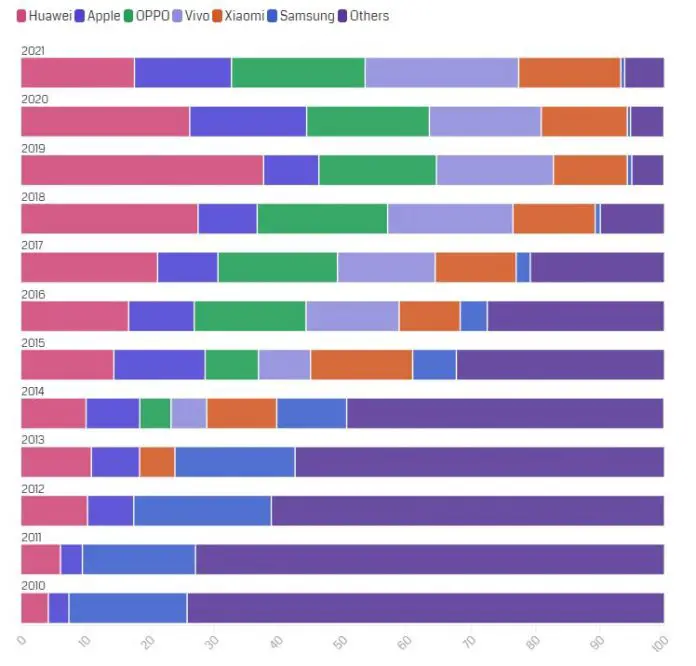The chart below shows China’s smartphone market share by vendor from 2010 to 2021.
Important takenotes
As you may see, in 2010-2014 the smartphone market in China was decentralized and Samsung was one of the dominating vendors.
In 2015, however, there was a tipping point when Chinese brands began to gain market share and significantly changed trends in the Chinese market.
If we talk about the leading brands in China, the market is now dominated by three main companies: Vivo, Oppo (both belong to BBK), and Huawei. Also of note is Xiaomi, which has been increasing its market share throughout 2019-2021.
If you combine these four brands, their combined market share is 78.2%
It should also be noted that Huawei more than doubled its market share in 2016-2019, but its market share declined in 2020-2021.
Another important trend worth noting is the increase in market share of other manufacturers (not highlighted in the statistics) in 2019-2021, the first time in almost 10 years that their market share has steadily declined.
Vendor’s market share in smartphone market in China (2010-2021)
Below, you can see the same data presented in a chart (market share in percent).
| Year/ Vendor | Huawei | Apple | OPPO | Vivo | Xiaomi | Samsung | Others |
|---|---|---|---|---|---|---|---|
| 2010 | 4.20 | 3.20 | 0 | 0 | 0 | 18.40 | 74.20 |
| 2011 | 6.10 | 3.40 | 0 | 0 | 0 | 17.60 | 72.90 |
| 2012 | 10.30 | 7.20 | 0 | 0 | 0 | 21.40 | 61.10 |
| 2013 | 10.90 | 7.50 | 0 | 0 | 5.50 | 18.70 | 57.40 |
| 2014 | 11.20 | 9.30 | 5.40 | 6.20 | 12.10 | 12.10 | 54.90 |
| 2015 | 14.40 | 14.20 | 8.30 | 8.10 | 15.90 | 6.80 | 32.30 |
| 2016 | 16.70 | 10.20 | 17.40 | 14.50 | 9.50 | 4.20 | 27.50 |
| 2017 | 21.20 | 9.40 | 18.60 | 15.20 | 12.60 | 2.20 | 20.80 |
| 2018 | 27.50 | 9.20 | 20.30 | 19.50 | 12.80 | 0.80 | 9.90 |
| 2019 | 37.70 | 8.60 | 18.30 | 18.20 | 11.50 | 0.70 | 5 |
| 2020 | 26.20 | 18.20 | 19.10 | 17.40 | 13.40 | 0.50 | 5.20 |
| 2021 | 17.60 | 15.10 | 20.80 | 23.90 | 15.90 | 0.60 | 6.10 |
Key takeaways about the Chinese smartphone market
The Chinese market is considered to be the largest in the world, with shipments for around 460 million units in 2016. However, since then, the number has decreased, and now it’s estimated to be 340 million units (in 2020).






